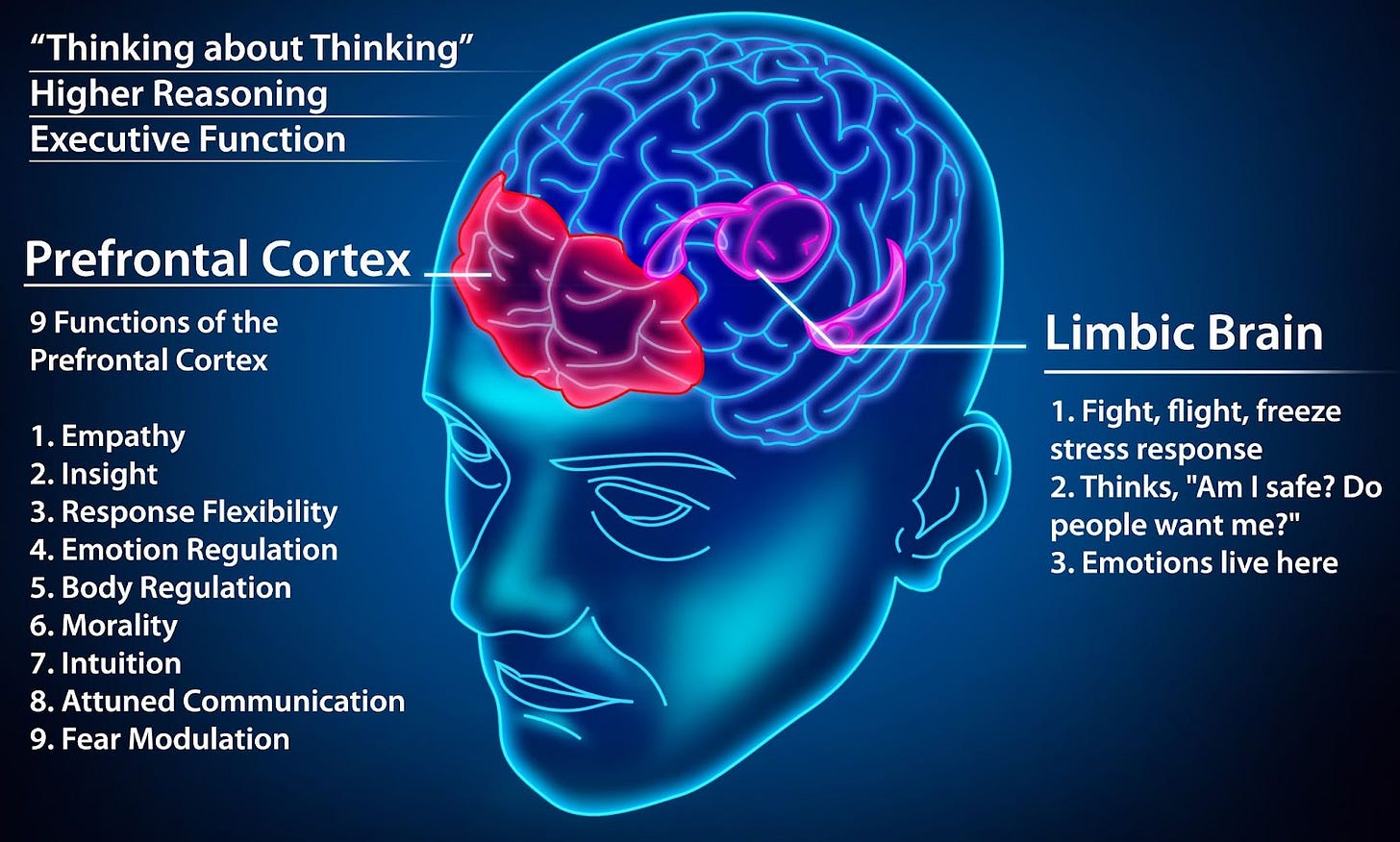Ponder This: Survive AND Thrive Understanding the Stress Response, The Liar in Our Head, and Our Inherent Worth
The Well Canto Newsletter Mental Fitness for Singers
March 22, 2024
Volume 6
Hello, Creatives.
Thank you for your patience as I took some unexpected time off to be with my family. Life is filled with ups and downs and changes of all sorts, which can make us feel unmoored, unsure, questioning, and exhausted. We NEED our Mental Fitness for all of life’s challenges. I am no different, and for the last 4 weeks I have leaned heavily on my knowledge and practice of self-kindness and self-care. I am able to more quickly recognize old, destructive thought patterns and ‘stories’ (cognitive distortions) and recalibrate to seeing things as they really are. This doesn’t mean I can eliminate or avoid grief and suffering, but I can strive to suffer well by recognizing my own human experience, fostering my sense of common humanity, and connecting with loved ones.
Mary Rosamond Hunt Shirvis, my kind, generous and beautiful Mom.

Today in The Well Canto Newsletter’s Ponder This issue, we explore 3 interlinked, foundational ideas:
Stress Response - It’s physiological!
Cognitive Distortions - a form of Automatic Negative Thoughts (or ANTs).
Inherent Worth - We are valuable because we were born.
There is a lot here to ponder. Take it slowly, let it sink in. Get curious and stay open. You deserve it.
Lovely Singer, maintaining a state of general wellbeing is important to most of us, whether we conciously define it as a goal or not. External factors like life experiences, family dynamics, cultural considerations, political climate - not to mention a once-in-a-century global pandemic - all shape how each of us walks through the world. Internally, our thought patterns and general attitudes likewise profoundly affect us. Singers must continually work toward self-actualization as part of their overall training to become truly effective performers. And, like learning to sing, cultivating Mental Fitness is a long game.
Intrepid Singer, have you ever experienced any of these:
General anxiety about singing and/or performing
Self-criticism and judgment
“Compare and despair” thoughts and stories
Imposter syndrome
Procrastination, distractibility, avoidance
Resistance to new ideas or strategies
Need for control
Need to please
Victim or martyr mentality
Hyper achievement
Low tolerance for frustration
The Goal: Mental Fitness
Remember, Mental Fitness means being in a positive state of mind more often than a negative one. This allows us to move through life’s challenges (including the inevitable negative feelings and thoughts) more quickly and with less suffering, to truly enjoy all life offers, and to see things as they really are.
Just as physical fitness promotes strength, flexibility, balance, and endurance, Mental Fitness promotes resilience, open mindedness, determination, motivation, frustration tolerance, and self-direction. Becoming as physically and mentally fit as each of us can helps us to be effective in our daily lives and to reach our goals.
YES, Dauntless Singer, this is all part and parcel of becoming who you want to be. So let’s get to it.
CONCEPT ONE: Survive AND Thrive
Understanding the Stress Response
It is helpful for us Creatives to know what the stress response is, and that it is based in our biology for the purpose of survival. The primitive part of our miraculous brain contains an alert system (the stress response) to keep us out of harm’s way so that we can stay alive and go about the business of propagating the species (survival instinct).
When we encounter possible danger, our bodies respond by releasing chemicals that cause physical changes like rapid heart-rate, faster breathing, elevated blood pressure, tensed muscles, and depressed digestion. Also known as the Fight/Flight/Freeze response, this process is automatic and happens whether we like it or not! Although it may not feel great, our stress response - based on our survival instinct - is a good and necessary thing.
But if the stress response occurs too often, lasts too long, or is disproportionate to the situation, anxiety follows. Meant only to alert us to danger, the response should cycle off so we may resume the many other parts of living.
Anxiety is characterized by feelings of inner turmoil, worry, dread, uneasiness, etc. Generalized and unfocused, anxiety involves the expectation of a future threat, or a reaction to a situation which is subjectively seen as menacing. Anxiety can lead to withdrawal, depression, and deteriorating relationships.
Another part of our brain handles higher functions like empathy, creativity, complex problem-solving, insight, emotional regulation, and fear modulation. This THRIVE part of our brain can help soothe and calm the SURVIVE part of our brain. This is essentially what is happening when we practice deep breathing, meditation, mindfulness, and other techniques which help us occupy our body. So, while we are literally wired for fear and negativity - to keep us alive - we can also learn to recognize that an audition is NOT a hungry, murderous beast, and we can learn to employ our THRIVE brains to mitigate the automatic, physiological (stress) response.
Recap:
The stress response (Fight, Flight, Freeze):
Is biological and automatic
Evolved as a survival mechanism
Is meant to be a short-term alert system
Can be consciously mitigated
Survival Instinct -> Stress Response -> Negative Thoughts and Feelings -> Stuck-a-saurus
WATCH: Mic’d up ‘stuckasaurus’ highlight reel! 4 y.o. daughter narrates her snowboarding adventures.🏂
CONCEPT TWO: ANTs and Cognitive Distortions
The Liar that Lives in Our Heads
Did you know? The Stories we tell ourselves are rarely true. Our thoughts reveal our underlying beliefs about ourselves, others, and the world, and affect how we experience our existence. Approximately 90% of our thoughts are the same thoughts we had yesterday, and tend to occur on a loop. As mentioned above, we are wired for fear and negativity in service to our instinct to survive. For example, we will remember a wild mushroom we ate that made us sick more than the lovely flower we admired. The mushroom was a threat; the flower was not. This, by the way, is why it takes about three positive thoughts to negate one negative thought.
Automatic Negative Thoughts (ANTs)
ANTs are self-statements influenced by negative underlying core beliefs. They include negative thoughts about oneself, the future, or perceived threats from others. They tend to be reflexive and hard to control. Experiencing a stressful or traumatic event may lead to the development of ANTs. (Can’t really say this enough: this is our survival instinct at work!)
Cognitive Distortions
A subset of ANTs, Cognitive Distortions are errors in thinking patterns which emphasize negative biases. They increase vulnerability to depression, fuel anxiety, and generally make us feel bad about ourselves, and perhaps others. Our brains seek shortcuts to reduce mental burden, but ANTs and Cognitive Distortions are not based in fact or reality. Here is a partial list to give an idea of how creative our SURVIVE brains are in generating negative thoughts. Do you recognize any of these patterns in yourself or others?
Polarization
This is a way of thinking where everything is Black or White, All or Nothing, Good or Bad, Right or Wrong, Success or Failure, etc. There is no nuance, no shades of gray, no balanced perspective.
“If I don’t get a perfect score, I am a failure.”
Emotional Reasoning
Emotional reasoning leads you to believe that the way you feel is a reflection of reality. It turns feelings into facts despite evidence to the contrary.
“I feel inadequate therefore I am inadequate.”
Blaming
Blaming refers to making others responsible for how you feel and the belief that others have the power to affect your life, even more than you do.
“You made me feel bad.” (sad, angry, hurt, etc)
Overgeneralization
With overgeneralization, an isolated negative event turns into a never-ending pattern of loss and defeat. Words like ‘always’, ‘never’, ‘everything’, and ‘nothing’ are frequent in your train of thought.
“I always get stuck in traffic. I can never catch a break.”
Labeling
Labeling or mislabeling refers to taking a single attribute and turning it into an absolute. This happens when you judge and then define yourself or others based on an isolated event. The labels assigned are usually negative and extreme.
“She was late to rehearsal; she is a hot-mess.”
Mental Filtering/Discounting Positives
Mental Filtering is straining all positives from a situation while exclusively focusing on the negatives.
“I messed up the very last note!”
Similar to Mental Filtering, Discounting Positives is dismissing positives as something of no value.
“That was a fluke. I was just lucky that time.”
Jumping to Conclusions/Mind Reading/Fortune Telling
When you jump to conclusions, you interpret an event or situation negatively without evidence supporting such a conclusion. Then, you react to your assumption.
“My throat is scratchy… I must have vocal damage!”
Mind Reading is assuming you know what someone is thinking.
“He didn’t say ‘hi’ today... He thinks I’m an idiot!”
Fortune Telling is predicting how a situation will turn out.
“My audition is going to suck.”
Personalization
Personalization is believing that you are responsible for events that are actually completely or partially out of your control. Additionally, you may take things personally. Both may lead to feeling guilty or assigning blame without considering all factors involved.
“If I had been a better friend, he wouldn’t be depressed.”
Catastrophizing
Catastrophizing is related to jumping to conclusions. In this case, you jump to the worst possible conclusion in every scenario, no matter how improbable it is.
“If I make a mistake I’ll never work as a singer, and all my dreams will die.”
Should Statements
‘Should’ statements are subjective, inflexible rules you set for yourself and others without considering the specifics of a circumstance. Things should be a certain way with no exceptions.
“I should practice 6 hours every day.”
Fallacy of Change
The fallacy of change is expecting other people to change their ways to suit your expectations or needs, particularly when you pressure them enough. If others don’t change, you can blame them and avoid taking responsibility for your own happiness.
“You need to be more social so we can go to parties together.”
Believe it or not, this is only a partial list of Cognitive Distortions! Others include:
Fallacy of Control
Fallacy of Fairness
Fallacy of Heavenly Reward
Always Being Right
Negative Predictions
Magnification and Minimization
…and still more.
Remember that these patterns are mental shortcuts (to reduce cognitive burden), highly subjective (not based in reality or evidence), and tend to allow us to avoid taking responsibility for our own feelings and thoughts. They are errors. When you recognize any of these patterns in your own thinking (we ALL have some of them from time to time) please do not harshly judge yourself. Remember that awareness is always the first step.
Once we become aware that many of our painful feelings come from distorted thinking, which originates in our biological need to survive, we can start taking steps toward learning to calm our SURVIVE brain with our THRIVE brain. In our next Ponder This we will explore more concepts and concrete actions to help us counteract ANTs. Here is a preview: we will begin to let go of judgment in favor of self-empathy.
CONCEPT THREE: Each of us has Inherent Worth
We are worthy simply because we were born.
Inherent (adjective) - Existing in someone or something as a permanent and inseparable element, quality, or attribute.
Worth (noun) - The state or quality of having merit or value.
Beautiful Singer, I invite you to think of Inherent Worth as elemental. You were born, therefore you are worthy of love and belonging. This applies to everyone; no exceptions. No one is better or worse than another. Each of us has value simply because we exist. And, our worth is immutable - it does not change according to circumstances, state of being (such as self-esteem), or any other influence. Why is it important to recognize our Inherent Worth? Two main reasons:
1) So that we know we are all starting on the same page - on a level playing field - and that hierarchical systems are ideological constructs,
and
2) To recognize humanity, our shared experience, that we are all connected. As news anchor Hugh Downs said, “To say my fate is not tied to your fate is like saying your end of the boat is sinking.”
You, Tender Singer, do not have to hustle for love or approval.
But what about a person who walks around with a superior attitude? What about narcissists? What about the people who literally tell us they or their group is entitled to more? I’m certainly not arguing that unequal treatment under the rules of society and law doesn’t exist. Unfortunately, the proof is all around us. I’m only suggesting that we needn’t automatically buy into that particular form of gaslighting. We can learn to recognize arrogance, self-importance, and pomposity for what they are: deep pain and insecurity. We are all perfectly imperfect.
OK! We are dealing with big concepts here, and you’ll be happy to know there will not be an exam on this material. Let the information you read in The Well Canto Newsletter wash over you. Let it spark your curiosity. Read and re-read, share and discuss, and you will start connecting the dots of understanding.
Being a human is a lot. Navigating our way through the world is indisputably challenging. Being a performing artist is a whole ‘nother level up. We must work very hard, be very honest with ourselves, and live our values everyday. Our most excellent ride is just beginning .











GREAT article and information for young artists!